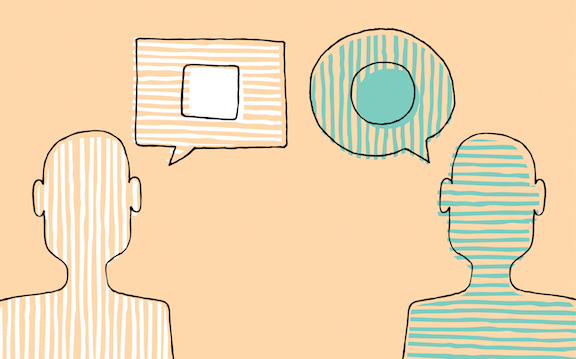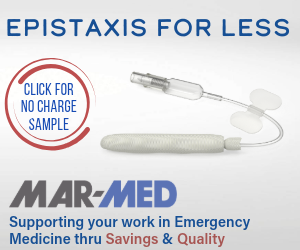Let’s worry a little less about using big words, and a little more about being understood
Seeing ourselves as others see us, according to Robert Burns, is a consummation devoutly to be wished. I contend that hearing ourselves as others hear us would be even better.
As I ruminate on memories past, the difficulties of communication between doctor and patient trouble my mind in complex ways. The causes are simple enough. To begin, the great majority of physicians come from upper class families. They have been schooled at the better-named institutions; went to see plays in high school. Most of their parents corrected their prose at the dinner table by informing them what “educated people do or don’t do.” These well-bred children also had an aunt who would go into apoplectic fits if she heard them say “me and him are going to the movies.”
Foreign physicians aren’t any better, for most come from even higher class families in their native countries. They had to be even smarter in their medical studies to even dream of getting into medical practice in the United States. Since English isn’t their primary language, they are even more precise in its usage.
The long and short of it is that the legions of physicians practicing today are an articulate and literate group. This is a good thing, right? Not so fast.
Sometimes I believe we have built a tender and gilded cage for our thoughts and ideas from which our true meaning can never escape. Don’t get me wrong. I am as much sinned against as sinning in this proper speech jungle. My children will be quick to tell you of my endless corrections of their lapses when attempting the correct usage of the gerund of the verb, the humiliation of split infinitives and the unpardonable sin of double negatives.
The real problem with language as I see it is that physicians have lost the basic one-on-one ability to speak to and treat normal people. We all have at least two languages: the formal English we are taught and in which we write in formal communication. Then there’s the dialect we actually use in living our everyday lives. No one actually speaks in complete sentences. If you actually look at communication, it’s built of bits and pieces between people who know what the other is going to say before they say it. I’m married. I don’t have to speak in complete sentences because my wife finishes them all. This is how each one of us actually lives. And it’s how our patients speak. This is the language – plainspoken conversation – that we need to use if we’re to get our salient points about their illness across to them.
There are about 6,000 languages in the world, each a bundle of dialects strung together. English is no different, and the variations in tongue across the land fascinate the ear and give us some character. Northern Black English is different from Southern Black English. Valley Girl speech, Bostonian English, Midwestern Anchorman English (which comes with a love of hair products), Texas Bar Fight English and Canadian English are all only loosely related. If you think there is a homogeneity to our mother tongue you are wrong.
During my young and naïve youth, I added to my language quiver Detroit-Steel-Mill English, Musician-Playing-In-Bars-And-Strip-Club English, Carpentry-Shop English and a Horny-College-Boy English. One needed to be careful where you used which dialects so as not to be mistaken for an “uppity college puke” in the steel mill. I know I’m bad in saying this but our selection of word, tone of voice and attitude reflect who we are at that moment in time. My attempts to keep all of these dialects separate was not always successful but at least I made it through intact.
I was lucky. Every dialect I’ve ever learned I actually needed at some point in time in the emergency department. Coming from an immigrant home, my parents wouldn’t know Shakespeare from Spinoza. You said exactly what you meant. I never had any job that didn’t make me a better doctor and an even better communicator. On one particular shift, a resident came to me and said: “Mr. Smith wants to sign out AMA.” Well, I’d seen Mr. Smith’s EKG, which starred big ST segment changes and featured all the correct inversions. There was no way this gentleman was leaving against medical advice. I said to the resident: “What did you tell him?” His reply: “Well, I told him he had an acute anterior-inferior myocardial infarct.” I went into the room, looked right at Mr. Smith and told both he and his wife that he was having a big heart attack and he could walk out the door and drop dead. Did he question it? No. He stayed. He was grateful. He went to the cath lab and was probably saved. No resistance. No problem. Why? Because I’d put it in a way that he could understand it. It just so happened he thought that the resident had called him inferior. I guess he wanted to have a superior infarct or nothing.
No dialect is superior to another; it’s just ways of communicating. If it gets the point across, it gets the point across. No physician should be deluded into thinking big words actually let the patient know what’s going on. To think the patient with an acute MI might have left over a simple word misunderstanding sends shivers down my spine.
The dominant dialect in any culture is the one that usually comes with an army and a navy attached to it. It has the power to dominate. But that does not make it right. I have shifted in my thoughts on this problem over the years until I’ve come to realize that most of the variances don’t make much difference. In the end it just doesn’t matter much so long as you have effectively and efficiently made your point. Just don’t ever tell my children I said that.
Counter to common opinion, you can have too much education and not enough common sense. Doctors have created a medicalese, the 10,000-word vocabulary picked up in medical school that only a select few understand. Compounding this are the philosophies of disease which only doctors are willing to accept. No patient should have to learn a new language to understand what we are saying to them.
We revel in this cult of medicalese for a variety of reasons. First, such big words, most of which we don’t fully understand, proves that we are members of a selective club. Nobody else is really allowed in. Second, bombastic medical phrases hide the fact that no one really knows what’s happening. And lastly, we use insufferably complex medical jargon to keep down resistance and inquiries on the part of the patients.
As an aside, we are certainly not the only profession that does this. The ultimate in too much gobbledygook and not enough real understanding is the law. That is the vast arena where control of the language controls the situation. There is no concept in law that the average third-grader can’t understand. But everything must be covered in constructive ambiguity so they can argue about it forever, coming to no conclusion and running up huge bills. Res ipsa loquitur, et cetera, et cetera. The thing speaks for itself, and so on, and so on.
So where do we go from here? Good question. We are not going to reeducate most doctors and send them to work at union jobs to learn how real people speak and think. But there are solutions to this problem. Making certain that the patient understands is key. First, perform the simple surgical procedure of removing the broom handle from your ass. Second, speak to the person as a human being. Phrases like “failure to do so could have negative consequences” are the kind of advice no patient should have to translate. “You could die.” “You could hurt yourself.” “You could mess up your brain.” “You could have your mind explode.” These are all good phrases when talking to teenagers about their drug overdose problems. These are all phrases which the young can relate to and understand. No long discussions of betz cell problems. They won’t know and they won’t care.

Making certain everyone in the room gets their questions answered in a language they understand would make patients happier than you can imagine. When you go to the car dealership and the mechanic says: “Your Pitman Arm needs replacing,” most of you just nod your head and agree. The simple reason is you don’t even know where the Pitman Arm is and you don’t want to appear stupid in front of anybody. The fact that you don’t know the name of a part on your steering mechanism does not mean you’re not interested in your own safety. Your job in the emergency department is to lead patients to an understanding, not belittle them because of their minimal knowledge base. Your job is to make them able to participate in the process, not be frightened by the process. A smile and a handshake are still the best communication tools ever invented no matter what Mark Zuckerberg says.
It’s about getting to the point of the matter. And not just in the ED. I should have taken my own advice years ago. Although I am not yet ready to have my children end sentences on a preposition, I think I probably should have gone a little easier on them. With my grandchildren, I’ll let a few more verbal faux pas slide and laugh a little more. Looking back, I should have corrected my children’s English less and loved them a lot more.
“The weight of this sad time, we must obey.
Speak what we feel; not what we ought to say”
—King Lear (W. Shakespeare)






3 Comments
To those of you reading carefully I know you have already picked up the two grammatical mistakes in this article. Sorry. Greg
Despite the “grammatical mistakes” a great article. Zuck has made it possible for me to retire early due to the FB IPO, but I agree “a smile and a handshake are still the best communication tools… ” Nice to see you in Maui at the EM conference.
Too many crutches disable us all. This is my new favorite selfie quote. Language is precision of vision. Telling a patient they have an anterior wall infarct, then saying the have had a heart attack gets the message across twice. If we stoop too much to conquer, all we will end up doing is falling on our faces. We need to raise our patients like our children, educating and guiding. Then we will all be better off. This is a whole lot better than Hows ya’all dew-in!